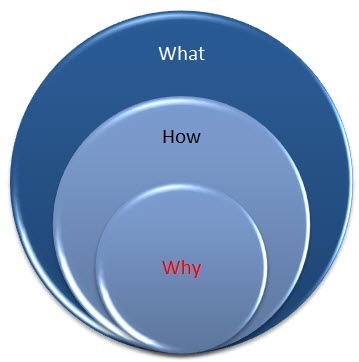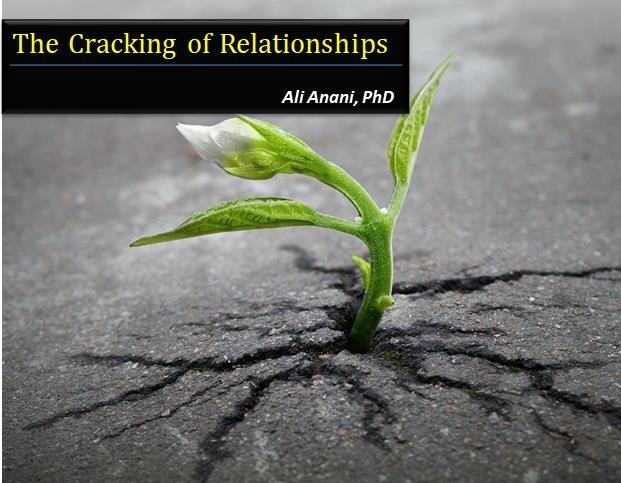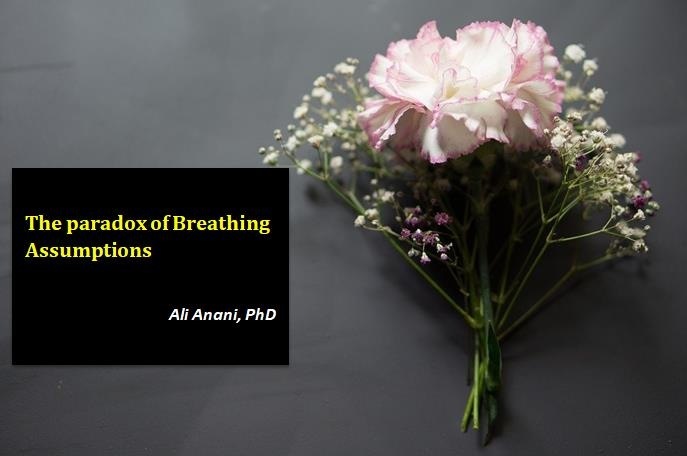When not to ask why?

A comment by Mohammed Sultan on my previous buzz read in part the following " A customer may attack you by saying if you really cared about customer service you won't DO that Instead of beginning your replies with Why do you think that? The smartest answer could be; when did you started to think that? Because the reply with why may give the customer an opportunity to blast you again, whereas when questions may help diffuse the confrontation by elevating his pre- assumption about his reasons".
This comment triggered my mind for two reasons. First, the Golden Circle of questions has in its core the why question. Should why then be relegated to a lower order? Second, could the why question act like adding cold water to very hot vegetable oil making the oil splash chaotically and possibly harm people who happen to be nearby?

Some question act like dark mirrors and reflect the dark aspect of issues at hands. Why this only happened to me? I heard this question from people who suffered a loss of a relative or got infected by a virus. The why question in this context acts like the dark (or black) mirror that shall only bring dark images that terrify most people.
Thinking deeper I find it true that the wrong timing of asking why could be a source of agitation and nervousness. Asking the customer why is asking for information that the customer may not have. This works against his/her expectations. The customer needs information and we ask him to answer what the customer doesn't know. This could infuriate the angry customer and make him/her splash his "oil of anger" chaotically. We need to replace the dark mirror with a white one to generate hope for the customer and us alike. Instead of asking why this happened to me we could ask "what could I do to stop this happening again to me". This time the white mirror will reflect hope and possibilities that were absent from our minds.
I the sea of darkness we look for fluorescent animals that show us the light. We need to avoid questions that add darkness to the darkness that we experience. When we comment on a buzz we should pay attention to the question we are asking. Instead of asking an author why did you mention this or that we may shift the focus to what factors or elements that made the author writes this or that? The why may sound skeptical and challenging; in contrast, the question may even help the author review peacefully what he wrote and offer new insights.
What to ask and not to ask seem to be an area that warrants more attention. What do you think?
""
مقالات من Ali Anani
عرض المدونة
Is trading ideas in meetings similar to trading stocks in stock markets? · Can the stock markets be ...

We build relations with friend, customers, with family members and with the world and with even our ...

It amazes me the life lessons we learn from nature. One great lesson is our tendency to “breathe ass ...
المتخصصون ذوو الصلة
قد تكون مهتمًا بهذه الوظائف
-
Senior Project Coordinator
تم العثور عليها في: DrJobEn JO A2 - منذ 6 أيام
Jordan River Foundation Amman, الأردنEnsures that the project staff are implementing the project activities in accordance with the terms and conditions prescribed and approved in the project documents; · Review and update work plan throughout the program with the guidance and management support from Program Manager; ...
-

Outbound Sales Development Representative
تم العثور عليها في: DrJobEn JO A2 - منذ 6 أيام
Customer Amman, الأردنOutbound Sales Development RepresentativeSome things you'll do · Prospecting: Use our tech stack (Apollo, LinkedIn SalesNav, Salesforce, Crunchbase, etc.) to identify and create an ongoing list of new leads in our target market in order to book qualified sales meeting for our Sal ...
-

Oracle programmer
تم العثور عليها في: DrJobEn JO A2 - منذ 3 أيام
Lsvisionco Irbid, الأردنPerform design and development of Oracle applications according to project requirements. · Design, code, and maintain the Oracle systems based on established standards. · Understand project requirements and develop design specifications. · Perform initial design reviews and recom ...


التعليقات
Ali Anani
منذ 7 سنوات #44
The bell tolls with the what and when questions
Ali Anani
منذ 7 سنوات #43
This is an extremely enlightening comment dear Pamela \ud83d\udc1d Williams. It is not only when to keep our mouths shut, but also when to keep the "question faucet" closed. I do thank you genuinely for contributing this great comment my friend.
Ali Anani
منذ 7 سنوات #42
I am really amazed by the quality of your comment Pamela \ud83d\udc1d Williams. The ordering of questions is a new idea as you are the first one to point out to this possibility. I like the sequence of the questions you suggested. Yes, not all why questions are bad especially if ill-timed. The quality of why questions is governed by the response they produce. If the response is creating feeling of self-blame is totally different from exposing the inner of characters as you you did very well in your fictions. It is easy to ask; the question is what kind of responses your questions generate?
Ali Anani
منذ 7 سنوات #41
Ali Anani
منذ 7 سنوات #40
Ali Anani
منذ 7 سنوات #39
This is precisely my previous comment to Mohammed Sultan for highlighting this issue
Ali Anani
منذ 7 سنوات #38
You encourage me to rethink the proper timing of asking the what- why- how questions
Ali Anani
منذ 7 سنوات #37
I am very happy to read your comment and its balanced tone. It is interesting indeed to combine the why and how. I have just commented on a post on LI highlighting questions great leaders ask. It surprised me that all questions started with what. I find what is a foreward looking one. Do you use what as well?
Harvey Lloyd
منذ 7 سنوات #36
"You can always ask why. Just don't be afraid of the answer." Great response. If we ask why, we will receive an answer. As you stated, maybe not the one we expected. I think you grasp the concept well. I can do about anything, i just need to insure i am willing to endure the consequences. Taking responsibility for your own actions.
Ali Anani
منذ 7 سنوات #35
Your simple, but profound comments are easy to understand, but to absorb fully needs pondering on Harvey Lloyd would comment.
Ali Anani
منذ 7 سنوات #34
You explained it extremely well and without fear or hesitation Joris Plaatstaal. I respect your transparency and stand. The comments revealed we have three clusters of opinion: that who are pro asking why, those who object to it and those who accept it with some reservation. You see even a question like this shows how we think differently. It is an opportunity for all of us to learn and move forward without fear or being accused of just being honest followers. I appreciate every word of your comment.
Harvey Lloyd
منذ 7 سنوات #33
Yes, Covey is a very simplistic approach to gauging who we are, what we are doing and why we do it. The word why is a reserved word for myself. It is a introspective word that i ask myself many times. Why, in self awareness makes sure that my motives are pure. I usually ask myself the why question when i receive unintended results. Often i find that motives are not pure and seek forgiveness. Sometimes my motives are pure but presentation/articulation was inappropriate, seeking forgiveness, others i find my motives and presentation were sufficient and invite dialogue of a new paradigm if the situation can support itself. I can not ask other why only myself.
Ali Anani
منذ 7 سنوات #32
Yes, indeed and I "sensed" the similarity. I agree with you on the importance of the why question ONLY if asked in the right context. It is an important tool to to discover the "thought patterns"; paradoxically it also could remind people of the past and not of the future to move on with their lives. You have the sense to apply this tool correctly. You know of the 5-why questions to uncover the root causes of a problem. Equally, I am sure of drawbacks of asking why in the wrong way and tone. You make me think and I am therefore grateful to you.
Ali Anani
منذ 7 سنوات #31
You keep inspiring me dear Mohammed Sultan. I tend to agree with you for when we repeat a habit we don't think about the why. I have now the habit of drinking lots of water in the morning and I just do it with spontaneity. If I ask why I do it then it is not an implanted habit.
Ali Anani
منذ 7 سنوات #30
Ali Anani
منذ 7 سنوات #29
AGain dear@Sara Jacobovici I have to respect my limitation (paradox). I am enjoying the exchange of comments between you and dear @Edward Lewellen and learning from both of you. All I can say I am not an authority on this topic. However; there is a general understanding that why questions should be asked with care. I hope your dialogue continues so that we readers may know more.
Ali Anani
منذ 7 سنوات #28
Dear Edward Lewellen why questions can be powerful if timely and properly phrased. I enjoy your analysis and where questions initiate in our brains. That is a speciality that I feel I am just a listener when you talk about. The author of 'The 90-Second Mind Manager", yourself, is in a solid basis to discuss such issues and learn from you.
Ali Anani
منذ 7 سنوات #27
#41 There is a general tendency that why questions may lead to passivity and to the past events. Why did this happen to as one example. Nt all why questions are like that. For example; why does something work this way? This is a question for us to explore. So, even if why questions may be in general negative,; they can still be powerful in other cases.
Sara Jacobovici
منذ 7 سنوات #26
Hi Edward Lewellen. This is either the first time, or the first time in a very long time that I will respectfully disagree with your comment. It's not the question why that is connected with the reptilian brain, it is the attached emotions to the situation and the context of the why, which is connected to the reptilian brain. Why, developmentally speaking is attached to higher abstract cognitive functions. The question allows us to "think out of the box". Asking how in the same question as an emotion ("...upset...") may be a challenge to the listener because it kicks in the functional while trying to hold an emotion. Not easy work. When you ask why and attach it to a positive emotion ( "Why do you feel good about this situation now...") it has a better potential for resolution.
Harvey Lloyd
منذ 7 سنوات #25
Now i understand your question Sara Jacobovici. You were really discussing the actual word why. I'm glad i did not answer it well or at all. You have done an awesome job of expressing its nature in this comment. Thanks. It's a keeper. Specifically the terms operational/functional. This is a good word set and describes other ways to get information and understand.
Sara Jacobovici
منذ 7 سنوات #24
Harvey Lloyd
منذ 7 سنوات #23
I agree i was a little broad with my why, and narrow in my understanding. But was only trying to offer some understanding of how why may have gotten its reflective value when heard. Also keep in mind that the context of my comments were within negotiations, not general use. The word why is usually asked because we don't understand an issue/situation. I was introducing better words/statements than why, more than challenging the word itself. The broader implications theme of the post was a discussion concerning the use of the word and the negatives that could be experienced in an effort to answer the question introduced.
Sara Jacobovici
منذ 7 سنوات #22
Hi Harvey Lloyd, you write, "I would imagine that why was a word we often associated with our child narrative". True, but so are other question words like "what do you think you're doing?", "when were you supposed to get that done?", "how do you think you'll ever be able to do that right?", and so on. It's the blame and shame aspects that you spoke about rather than the word why itself.
Harvey Lloyd
منذ 7 سنوات #21
This man was truly wise. The wise man's division was filled with resources but also the need for collaboration in figuring out the mathematics. Hopefully to the end that all of the resources would be shared. This also insured the younger son seeking the wisdom of his elder brothers. Also the elders to bring the young one along on the journey of wisdom. Yes any negotiations always have an end, you will either choose one or one will be handed to you. Stephen Covey has enlightened my journey for many years, i quote him often.
Ali Anani
منذ 7 سنوات #20
Ali Anani
منذ 7 سنوات #19
There is a nugget of wisdom in your coment Harvey Lloyd "I always found regardless of the othersides style i would practice win-win. I would advocate for their win also". This is staying away from selfishness if negotiations are to succeed. Well-taken point
Ali Anani
منذ 7 سنوات #18
Mohammed Sultan- This perspective of yours deserves a full buzz on its own ".Negotiation skills is considered as a real test of true leadership". I read many buzzes referring to the attributes of good leaders, but the majority of them overlook the attribute of leadership.
Ali Anani
منذ 7 سنوات #17
This perspective of yours deserves a full buzz on its own ".Negotiation skills is considered as a real test of true leadership". I read many buzzes referring to the attributes of good leaders, but the majority of them overlook the attribute of leadership.
Ali Anani
منذ 7 سنوات #16
Absolutely Harvey Lloyd and my friend your integral comment adds "What and how imply let's go, where why seems to say stop and discuss". You are exact and I may add that why takes us mostly to the past whereas what and how move us forward. Lovely contribution
Ali Anani
منذ 7 سنوات #15
Yes, Amina Alami- and you add a very important dimension "we need to consider the tone and clarity of the messages as well as the vibe we are giving off". Some tones can be repulsive in spite of the good content. I agree fully.
Harvey Lloyd
منذ 7 سنوات #14
Agreed. Splitting the pie is called compromise. I believe you would find that behind every success story is the act of win-win. Win-Win creates a third alternative of two parties where both get their own pie. I have encountered all styles of negotiating especially the win-lose and to a lesser degree lose-win. I always found regardless of the othersides style i would practice win-win. I would advocate for their win also. This was the only way i could venture into the other two without just saying the fourth alternative, no deal. You reminded me of the story of Solomon where he had to decide who was the mother of the baby between two mothers. His answer was split the baby, knowing the real mother would release the child. If your negotiations wind up in front of Solomon (Judgement) then he will always choose to split the baby. Compromise. Win-WIn will always create the third alternative. (Steven Covey)
Harvey Lloyd
منذ 7 سنوات #13
I agree, negotiations can be used in either a positive or negative light. Win Win is the only long term success core value. I often sense the why question is used when we don't understand something. But using the word doesn't always show our intentions to the customer. Help me understand your needs, or reflective language like i sense the situation has frustrated you. Language that opens up dialogue so that we can understand is vital to resolution. Communications style is always about intent. Either in presentation or listening. Certain words or styles show an intent that is different than what we mean. Learning and understanding the language of negotiations is an art form. I don't think we ever master it but the reach for understanding is the goal. Ali Anani has introduced a single word that is really the tip of an iceberg. What and how imply let's go, where why seems to say stop and discuss. Their are better ways to progress understanding and they are found in the world of negotiating skills.
Ali Anani
منذ 7 سنوات #12
Thank you for your quick response Mohammed Sultan would like to add his experience.
Ali Anani
منذ 7 سنوات #11
The bright side of pain is having connections with such great spirits as Irene Hackett
Ali Anani
منذ 7 سنوات #10
You are the one who triggered my mind to write this buzz dear Mohammed Sultan below. You certainly stretched my mind's muscles. Big thank you to you dear Mohammed.
Ali Anani
منذ 7 سنوات #9
I have one question for you dear sister Irene Hackett. How come you are so mature? Your comments reveal your depth. Yes, with maturity we know what questions to ask. Questions this way are the white mirrors. Your comments steadily are.
Ali Anani
منذ 7 سنوات #8
My truly dear sister Irene Hackett- your wisdom flows without interruption. I wrote a presentation on The Problem is Knowing the Problem. http://www.slideshare.net/hudali15/the-problem-is-knowing-the-problem Now, I say the question is knowing the question... to ask. Your comment is simply reflective of reality. You wrote "No doubt, communication is an Art form where questions may be one of the Artist's many brushes and relationships are the canvas". Well, I dare say loudly you are The Communicator.
Ali Anani
منذ 7 سنوات #7
The proof is when the wheel are running on the road. Your comment is the proof that what I write reflects joyon me because I learn from enriching comments like yours Harvey Lloyd. Your paragraph "If i ask you Ali "Why did you write this post?" you will tell me from a perspective of most likely defense. If i were to ask the question from a different perspective, "Ali help me understand your post?" You become a teacher. I would rather hear a teachers response than a defensive persons response" froze me with its beauty, depth and credibility. All your examples are masterful and your reference to negotiation is timely. Like you said "WHY is a dreaded question inside of any negotiation. If you say you have exhausted your abilities and if the customer uses it then they have not understood a word you have said or worst you have talked about the wrong issue". You are my teacher. I do learn from you.
Ali Anani
منذ 7 سنوات #6
You have your very unique experiences that enriched your life . May be this uniqueness that make your comments different from others sometimes. It is great to keep your authenticity.
Ali Anani
منذ 7 سنوات #5
It is comment #120 (about the middle of the comment".
Harvey Lloyd
منذ 7 سنوات #4
Ali Anani
منذ 7 سنوات #3
This is an incredibly positive comment Antoinette Capasso-Backdahl. I loved every word of it. Your mentioning of the " Even if you do you will still run into the observer effect". This is incredibly true. Your reference to the "founder's syndrome" is spot on. Yes, we should be grateful to customers for highlighting our deficiencies. They provide us with the opportunity to learn and evolve. I am therefore very grateful for enriching the comments with your splendid one.
Ali Anani
منذ 7 سنوات #2
I am glad to read your very convincing comment . I agree with you without questioning. I enjoyed this part of your comment immensely "I often tell people not be afraid of looking into that dark mirror and realize they the have power of choice and that understanding our darkest of desires and capabilities is the very thing that refines the light we shine in public view". This is one motive for me to have written this buzz. You spoke my mind.
Ali Anani
منذ 7 سنوات #1
This is one of your most glamorous comments dear debasish majumder. I enjoyed reading it immensely. I loved this "we tend to deceive customers for our purposes and expecting them to be dancing in our tunes". This is deep thinking. I love the spirit of this comment. It really made me happy. Thank you